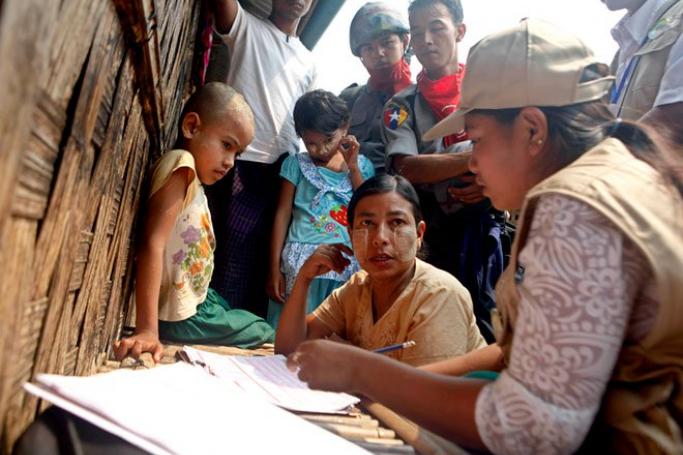Later this year the government will release more results from the 2014 census. We have already learned that Myanmar’s population is 51,419,420, which is somewhat lower than many had guessed.
It makes sense that the census data to emerge in 2015 will offer other opportunities to re-appraise our most basic understandings of the country. Better socio-economic numbers will be a boon.
We are also told the most sensitive parts of the story won’t see the light of day. The government has committed to ensuring that the census results do not add fuel to the cauldron of communal tension. The potential for information about ethnicity and religion to ignite new fires cannot be ignored.
Sadly, there many people in Myanmar eager to seize any excuse to ram home their political advantage, especially this year with so much at stake in the looming election.
The government’s prudence is also partly motivated by the howls of concern that echoed in the months before the census was held last March and April. Some critics even demanded that the census should be abandoned, so high was the risk that it would lead to further disquiet, even death.
The fact is that any large-scale activity in Myanmar, especially one that deals with issues of economics, politics and culture, comes with some hazard.
The 2015 election is the next example. It could be accompanied by violence, especially in those corners of the country where consternation about the direction of political change is high. It was in the wake of the 2010 poll that new fighting erupted in Kayin, Shan and Kachin states.
Yet the prospect of such violence should not discourage the government from its agenda of rebuilding Myanmar’s key institutions. The census was a step in the right direction. It was also relatively peaceful.
Just as importantly, everything about its implementation – from the design of the questions, to the deployment of enumerators, to the announcement of results – was a learning process. Few people in Myanmar have direct experience of such work. They must start somewhere.
The same logic will apply to the 2015 election. There will, no doubt, be much hesitation about the fairness of the system and the inevitability of vote-rigging. Yet if Myanmar wants to hold elections regularly, or build the capacity to conduct its own census, or do anything else of administrative significance, then it needs to start somewhere.
The current advantage is that the international community is heavily invested in the success of Myanmar’s move away from dictatorship. This may prove to be a short-term bump in its global standing. Before long, the international attention will probably wane, and people will learn to settle for some compromise about the country’s democratic and economic prospects.
For examples of how such interest fades consider Cambodia and East Timor. In both cases, unfathomable international resources were deployed, for about a decade, to assist with the transformation of these war-torn, traumatised societies.
Optimism about their long-term prospects peaked, and then fell, and has now stabilised. It may be generations before either country eventually manages to meet the high hopes that came with the initial burst of international attention.
Myanmar, for the moment, is enjoying such a wave of global goodwill. It helps that nobody knows what the next chapter of the story will bring. There is confidence and trepidation in almost equal measure.
This is why the best time for Myanmar to seize on the chance to develop its own systems and processes is right now. The 2014 census was a perfect example of how an imperfect process can still help to generate useful information and the opportunity to do better next time.
(Dr Nicholas Farrelly is a partner at Glenloch Advisory and a Fellow at the Bell School of Asia Pacific Affairs at the Australian National University, Canberra)
This Article first appeared in the February 12, 2015 edition of Mizzima Weekly.
Mizzima Weekly is available in print in Yangon through Innwa Bookstore and through online subscription at www.mzineplus.com
The census and carpe diem
17 February 2015
The census and carpe diem












